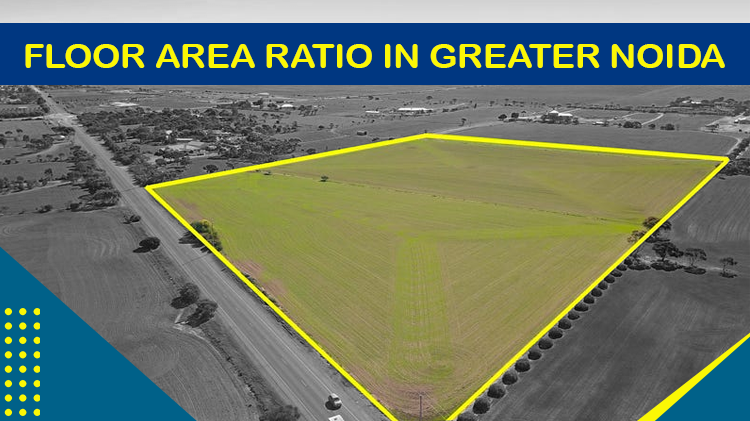Table of Contents
Greater Noida, a rapidly growing metropolis in India’s Uttar Pradesh state, has recently experienced tremendous infrastructure growth and urbanisation. Maintaining a balanced approach to urban planning and growth is crucial as the city grows. The Floor Area Ratio (FAR), a planning metric that regulates the ratio between a building’s total floor area and the size of the land on which it is constructed, is one of the crucial components in this regard. This blog will discuss the idea of FAR and its relevance to Greater Noida’s urban environment.
Floor Area Ratio (FAR)
The maximum allowed floor area that may be built on a particular parcel of land is determined by the floor area ratio, often known as the floor space index (FSI). The ratio of the total floor area to the plot area is used to express it. For example, a building with a FAR of 2 can have a total floor area that is twice as large as the land it is constructed on.
Also Read: Stamp Duty and Registration Charges in Noida Extension
Importance of FAR in Urban Planning:
FAR is essential to urban planning because it aids in preserving a balance between open space needs, infrastructural needs, and population density. FAR contributes to the regulation of building size, height, and density by placing restrictions on the amount of development, promoting a harmonious urban environment. It enables government agencies to effectively manage resources and encourage sustainable growth.
FAR in Greater Noida:
The Greater Noida Industrial Development Authority (GNIDA) is in charge of enforcing and maintaining FAR regulations in Greater Noida. The authority sets FAR limitations that take into account aspects like transportation, infrastructure, and environmental sustainability in order to produce a well-planned and organised cityscape.
FAR Limits and Zoning:
The Greater Noida FAR restrictions differ according to the area’s zoning classification. To secure the proper use of land and ensure the creation of a balanced urban fabric, various zones, including residential, commercial, industrial, and mixed-use, have separate FAR rules. The zoning restrictions also take into account things like required setback distances, road width, and the presence of amenities.
Factors Influencing FAR:
The following considerations are taken into consideration when determining the FAR limitations in Greater Noida:
- Infrastructure is comprised of the presence of water, sewage, energy, and transportation networks.
- Environmental Concerns: Maintenance of parks, green spaces, and ecological harmony.
- Public Facilities: The availability of educational institutions, medical facilities, community centres, and other necessities.
- Traffic Management: The size of the roads, parking options, and accessibility.
- Preservation of historical sites and architectural heritage is part of legacy and culture.
Benefits of Appropriate FAR Implementation:
For Greater Noida, maintaining an ideal FAR has various advantages:
- FAR ensures efficient use of the scarce land resources by permitting increased construction in specific regions.
- A balanced development pattern is encouraged by FAR laws, which prevent overcrowding in some regions while fostering expansion in others.
- Increased Quality of Life: Residents’ quality of life is increased when there are enough open spaces, better infrastructure, and well-planned neighbourhoods.
- Sustainable Growth: FAR standards promote ecologically friendly behaviours, such as energy-efficient construction and green areas, which helps to create a sustainable urban environment.
Check: Floor Area Ratio in Delhi
Conclusion:
Floor Area Ratio (FAR) is a vital instrument for urban planning and growth, especially in places like Greater Noida that are experiencing significant population growth. FAR ensures a balanced approach to urbanisation, fostering sustainable growth and enhancing the quality of life for residents by properly limiting the size and density of structures. In order to produce a well-planned and organised cityscape, the Greater Noida Industrial Development Authority is crucial to the implementation of FAR laws. To contribute to the city’s sustainable and harmonious development, developers, architects, and citizens must comprehend and abide by the FAR requirements.
